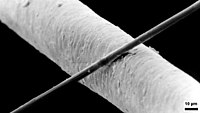
Photo from wikipedia
Abstract In carbon capture and storage (CCS) wells, the well cement is attacked by CO 2 -rich fluids, coupled with tensile stress. In this study, well cement samples were designed… Click to show full abstract
Abstract In carbon capture and storage (CCS) wells, the well cement is attacked by CO 2 -rich fluids, coupled with tensile stress. In this study, well cement samples were designed to be exposed to humid CO 2 gas and CO 2 saturated brine and simultaneously subjected to external tensile stresses with load levels of 25%, 50%, and 75% of the initial tensile strength. The experimental results showed that a higher external tensile stress (50% and 75%) facilitated the generation and propagation of micro-cracks in the tension zone of loaded samples. Hence, the aggressive CO 2 -rich medium found direct paths to penetrate further into the core, significantly accelerating the rate of carbonation and failure of the well cement. As a result of the faster ion exchange and transfer, the carbonation rate was faster and the onset of failure in samples immersed in CO 2 -saturated brine occurred earlier than in the supercritical CO 2 scenario. Findings from this study provide new, important information for understanding the integrity of well cement sheath under actual CCS well conditions, thereby promoting superior cement system design and safer operation.
Journal Title: Construction and Building Materials
Year Published: 2017
Link to full text (if available)
Share on Social Media: Sign Up to like & get
recommendations!